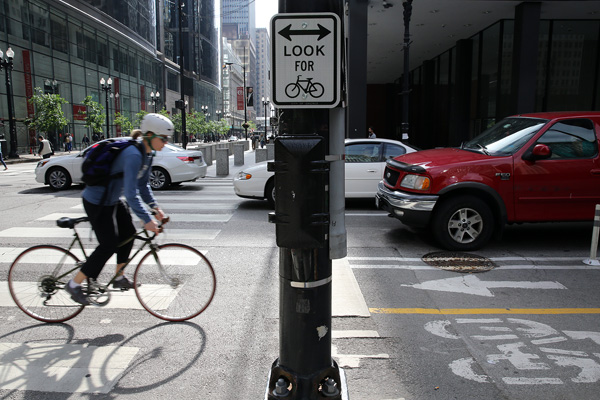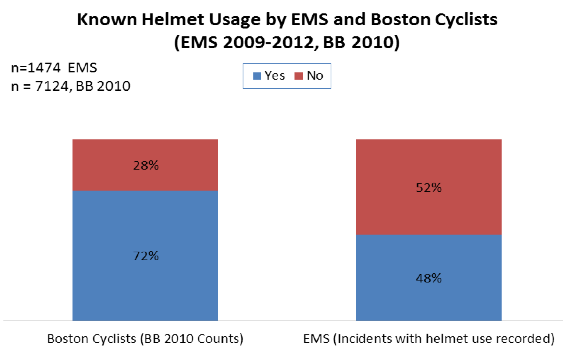
Photo: Antonio Perez/Chicago Tribune
This week is Bike to Work week in Chicago, designed to get the recalcitrant out on the streets. The Active Transportation Alliance has a nice, unexpectedly detailed guide ("wear a hat or bandanna under your helmet to reduce marks from helmets and the effects of wind on your hair"). More profoundly are "cross major streets at traffic signals" and "obey all traffic laws, signs, and signals."
Not everyone who rides will tell you to do this. Take Randy Cohen of the New York Times:
THE rule-breaking cyclist that people decry: that’s me. I routinely run red lights, and so do you. I flout the law when I’m on my bike; you do it when you are on foot, at least if you are like most New Yorkers. My behavior vexes pedestrians, drivers and even some of my fellow cyclists. Similar conduct has stuck cyclists with tickets and court-ordered biking education classes.
But although it is illegal, I believe it is ethical.
Cohen's defense is that he only does it when it's safe. Stop me if you've heard that, about anything, before. And that it's not really that big a problem:
If my rule-breaking is ethical and safe (and Idaho-legal), why does it annoy anyone? Perhaps it is because we humans are not good at weighing the dangers we face. If we were, we’d realize that bicycles are a tiny threat; it is cars and trucks that menace us. In the last quarter of 2011, bicyclists in New York City killed no pedestrians and injured 26. During the same period, drivers killed 43 pedestrians and injured 3,607.
Well, sure. Cyclists also make up 0.6 percent of commuters in New York City, with only parts of Manhattan and Brooklyn. Compared to cars, it's not going to make a, um, dent.
But perhaps this will convince you to stop at red lights1 and stop signs. A couple weeks ago the city of Boston released four years' worth of data about bicycle crashes, and calculated potential causes based on incident reports (it's neither "customary nor required" for BPD officers to write these down, so the reports are not comprehensive, but they were able to document a fair number of causes).
* "Bicyclist ran red light" accounted for 85 out of 891 incidents, almost four times the number of cyclists hit by drivers that ran red lights. Fortunately, Chicago is finding that giving cyclists their own lights is improving cyclist behavior.
(Drivers are actually genuinely impressive about obeying red lights. My bus stop is a perfect moral test for this: it's at an intersection on a fast street, where a left turn leads to a one-way residential street and a right into a city Streets and San lot used mostly to store salt. In other words, there's absolutely no cross-traffic whatsoever unless it's snowing, and no one ever rolls through the red light, except the occasional cop, even though it's probably the safest red light to blow in the city. Which is ethical even when it's not a matter of safety—traffic lights aren't just there to keep people from t-boning each other, they also control traffic flow.)
* "Cyclist rode into oncoming traffic" accounted for 108.
* "Bicyclist ran stop sign" outpaced "driver ran stop sign," 22 to 17.
* "Bicyclist speeding" accounted for 57 incidents, compared to 24 for drivers speeding.
But the number one cause was…
* "Vehicle operator or occupant—extended door": 197 incidents. Even though I've written about how dangerous doorings are, it surprised me a bit. It was the cause of more incidents than "driver did not see bicyclist" (156) or "operator—not paying attention" (31). This is why the ATA recommends that you ride with "enough room to ride outside of the 'door zone' when riding alongside parallel parked cars."
* Depressingly, "vehicle operator or occupant—aggressive behavior" was the potential cause of more incidents (35) than "operator—not paying attention."
And helmets: still probably a good idea.

When bike share (belatedly) rolls out, it's worth keeping this in mind.
1. Oh, and: that thing where cyclists ride through the crosswalk at a red light, then weave back and forth as cross-traffic passes, waiting for the light to change? That is especially ridiculous.


